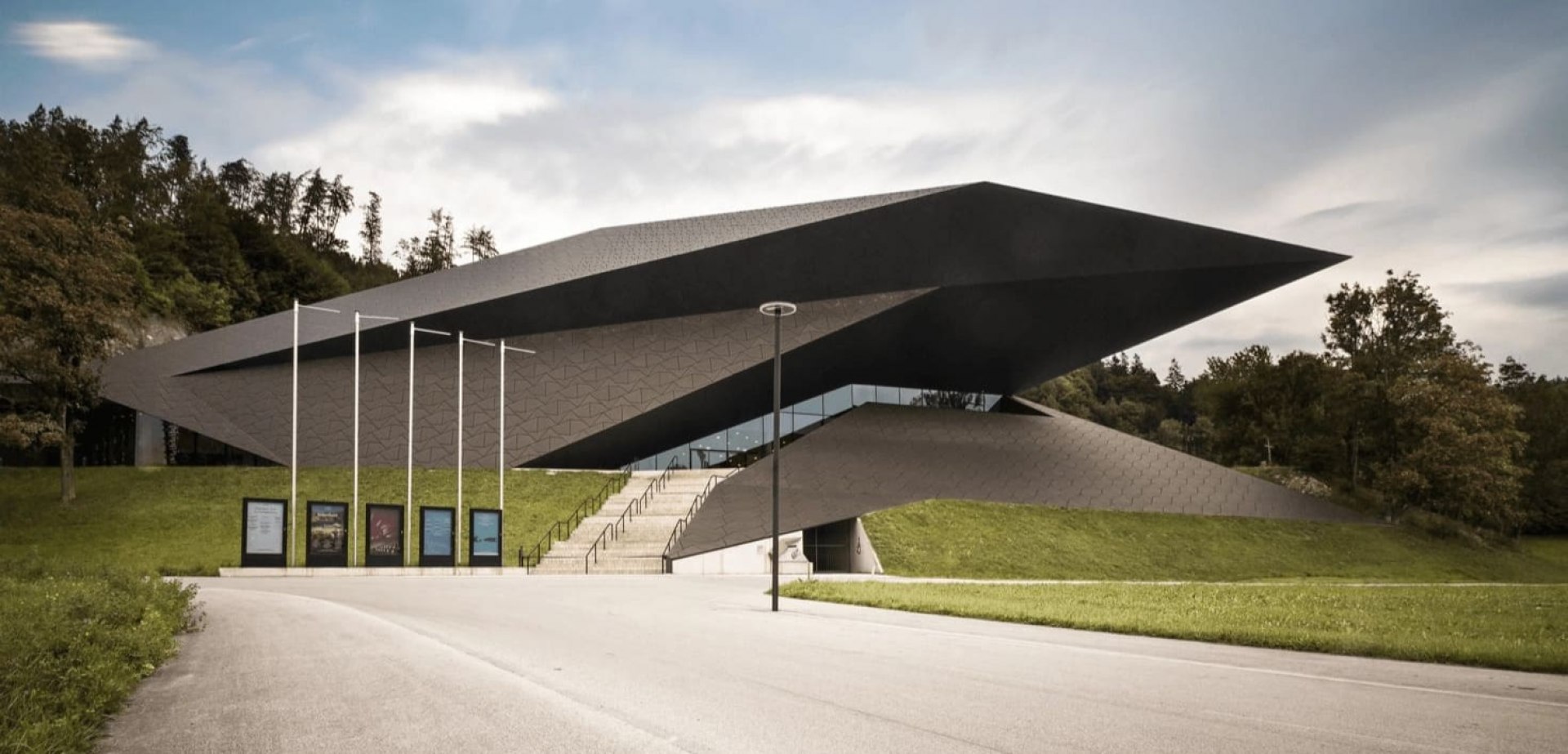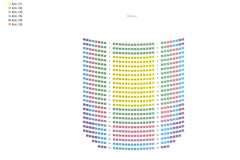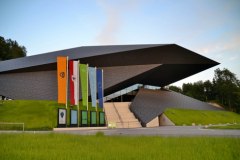Carmen
July 2026 | ||||||
|---|---|---|---|---|---|---|
Mo | Tu | We | Th | Fr | Sa | Su |
Georges Bizet: CARMEN (concert version)
After the success of the series of concert performances, the Tiroler Festspiele Erl will present another title in this format in the summer of 2026, and it is one that is rarely offered in its entirety as a concert version: Georges Bizet's worldwide hit Carmen.
Synopsis
Place: Seville, Spain, and surrounding hills
Time: Around 1820
Act 1
A square, in Seville. On the right, a door to the tobacco factory. At the back, a bridge. On the left, a guardhouse.
A group of soldiers relax in the square, waiting for the changing of the guard and commenting on the passers-by ("Sur la place, chacun passe"). Micaëla appears, seeking José. Moralès tells her that "José is not yet on duty" and invites her to wait with them. She declines, saying she will return later. José arrives with the new guard, which is greeted and imitated by a crowd of urchins ("Avec la garde montante").
As the factory bell rings, the cigarette girls emerge and exchange banter with young men in the crowd ("La cloche a sonné"). Carmen enters and sings her provocative habanera on the untameable nature of love ("L'amour est un oiseau rebelle"). The men plead with her to choose a lover, and after some teasing she throws a flower to Don José, who thus far has been ignoring her but is now annoyed by her insolence.
As the women go back to the factory, Micaëla returns and gives José a letter and a kiss from his mother ("Parle-moi de ma mère!"). He reads that his mother wants him to return home and marry Micaëla, who retreats in shy embarrassment on learning this. Just as José declares that he is ready to heed his mother's wishes, the women stream from the factory in great agitation. Zuniga, the officer of the guard, learns that Carmen has attacked a woman with a knife. When challenged, Carmen answers with mocking defiance ("Tra la la ... Coupe-moi, brûle-moi"); Zuniga orders José to tie her hands while he prepares the prison warrant. Left alone with José, Carmen beguiles him with a seguidilla, in which she sings of a night of dancing and passion with her lover—whoever that may be—in Lillas Pastia's tavern. Confused yet mesmerised, José agrees to free her hands; as she is led away she pushes her escort to the ground and runs off laughing. José is arrested for dereliction of duty.
Act 2
Lillas Pastia's Inn
Two months have passed. Carmen and her friends Frasquita and Mercédès are entertaining Zuniga and other officers ("Les tringles des sistres tintaient") in Pastia's inn. Carmen is delighted to learn of José's release from two months' detention. Outside, a chorus and procession announces the arrival of the toreador Escamillo ("Vivat, vivat le Toréro"). Invited inside, he introduces himself with the "Toreador Song" ("Votre toast, je peux vous le rendre") and sets his sights on Carmen, who brushes him aside. Lillas Pastia hustles the crowds and the soldiers away.
When only Carmen, Frasquita and Mercédès remain, smugglers Dancaïre and Remendado arrive and reveal their plans to dispose of some recently acquired contraband ("Nous avons en tête une affaire"). Frasquita and Mercédès are keen to help them, but Carmen refuses, since she wishes to wait for José. After the smugglers leave, José arrives. Carmen treats him to a private exotic dance ("Je vais danser en votre honneur ... La la la"), but her song is joined by a distant bugle call from the barracks. When José says he must return to duty, she mocks him, and he answers by showing her the flower that she threw to him in the square ("La fleur que tu m'avais jetée"). Unconvinced, Carmen demands he show his love by leaving with her. José refuses to desert, but as he prepares to depart, Zuniga enters looking for Carmen. He and José fight. Carmen summons her gypsy comrades, who restrain Zuniga. Having attacked a superior officer, José now has no choice but to join Carmen and the smugglers ("Suis-nous à travers la campagne").
Act 3
A wild spot in the mountains
Carmen and José enter with the smugglers and their booty ("Écoute, écoute, compagnon"); Carmen has now become bored with José and tells him scornfully that he should go back to his mother. Frasquita and Mercédès amuse themselves by reading their fortunes from the cards; Carmen joins them and finds that the cards are foretelling her death, and José's. The smugglers depart to transport their goods while the women distract the local customs officers. José is left behind on guard duty.
Micaëla enters with a guide, seeking José and determined to rescue him from Carmen ("Je dis que rien ne m'épouvante"). On hearing a gunshot she hides in fear; it is José, who has fired at an intruder who proves to be Escamillo. José's pleasure at meeting the bullfighter turns to anger when Escamillo declares his infatuation with Carmen. The pair fight ("Je suis Escamillo, toréro de Grenade"), but are interrupted by the returning smugglers and girls ("Holà, holà José"). As Escamillo leaves he invites everyone to his next bullfight in Seville. Micaëla is discovered; at first, José will not leave with her despite Carmen's mockery, but he agrees to go when told that his mother is dying. He departs, vowing he will return. Escamillo is heard in the distance, singing the toreador's song.
Act 4
A square in Seville. At the back, the walls of an ancient amphitheatre
Zuniga, Frasquita and Mercédès are among the crowd awaiting the arrival of the bullfighters ("Les voici! Voici la quadrille!"). Escamillo enters with Carmen, and they express their mutual love ("Si tu m'aimes, Carmen"). As Escamillo goes into the arena, Frasquita and Mercédès warn Carmen that José is nearby, but Carmen is unafraid and willing to speak to him. Alone, she is confronted by the desperate José ("C'est toi!", "C'est moi!"). While he pleads vainly for her to return to him, cheers are heard from the arena. As José makes his last entreaty, Carmen contemptuously throws down the ring he gave her and attempts to enter the arena. He then stabs her, and as Escamillo is acclaimed by the crowds, Carmen dies. José kneels and sings "Ah! Carmen! ma Carmen adorée!"; as the crowd exits the arena, José confesses to killing Carmen.
Program and cast
Musical Direction: Asher Fisch
Carmen: Aigul Akhmetshina
Don José: Michael Fabiano
Escamillo: Alexander Vinogradov
Micaëla: Pretty Yende
Orchestra and Choir of the Tiroler Festspiele Erl
Festspielhaus Erl
Festspielhaus
Designed by Delugan Meissl Associated Architects, Vienna, the extraordinary structure boasts 862 seats (130 of which are flexible seats near the orchestra) and the world’s largest orchestra pit (160-sq meters). The total useable surface is 7,000-square meter. General contractor was STRABAG, project manager Ing. Georg Höger.
The new Festspielhaus respects and compliments the architecture of the old Passionsspielhaus and its natural surroundings in a unique way: in the summer, when the Tyrolean Festival Erl or the Passion Plays take place at the white Passionsspielhaus, the dark Festspielhaus will blend with the dark forest, allowing the Passionsspielhaus to be dominant. In the winter it is the other way round: while the white Passionsspielhaus will fade into the surroundings, the dark Festspielhaus will stand out against the white landscape.
The Festspielhaus offers the modern infrastructure that has been sorely missing at the Passionsspielhaus, including a foyer with cloakroom, modern stage machinery, several rehearsal rooms and plenty of space for administrative offices. The Festspielhaus provides the Tyrolean Festival Erl with the basic conditions it needs to ensure the Festival’s success will continue into the future.
Passionsspielhaus
The Passionsspielhaus in Erl, built between 1957 and 159 on plans by architect Robert Schuller, is an architectural and acoustic masterpiece. The structure blends with its surroundings and is a visual extension of the adjoining mountains.
Thanks to its striking shape the Passionspielhaus instantly became Erl’s greatest landmark. Austria’s largest orchestra theater accommodates up to 1500 visitors. The 25-meter wide stage is tiered and provides a spectacular backdrop for the 500 passion play actors as well as the orchestra of the Tyrolean Festival Erl, which performs onstage as there is no orchestra pit.
A café serving snacks and beverages was added in 1997 and an Art Room for 150 visitors was opened in 2003.
When the Festspielhaus was renovated between October 2006 and April 2007 all sanitary facilities were upgraded; an “orchestra pit” with scissor lift and a substructure for the main stage were added; the auditorium got equipped with a deaf loop system and a new floor; the catwalk, the exterior design, the cellar beneath the donkey ramp, the refreshment stand, all electrical installations and the ventilation system were replaced; and the wardrobe and the stairway renovated.
YOUR WAY TO ERL
BY CAR
Germany, Eastern Austria
A8 Munich-Salzburg, Autobahndreieck Inntal, A 93, Motorway exit Nussdorf/Brannenburg or Oberaudorf/Niederndorf
Italy, Switzerland, Western Austria
Inntalautobahn A 12, motorway exit Kufstein Nord or Oberaudorf/Niederndorf; from Italy: after Brenner Pass take A 13 and A 12 (approx. 1 h 20 min to Erl); from the Swiss border it’s a 3 hour drive to Erl; the entire journey is on motorways and expressways.
In Austria, the use of motorways and expressways is subject to payment of a toll.
Munich – Erl approx. 1 hour by car
Salzburg – Erl approx. 1 hour by car
Innsbruck – Erl approx. 45 hour by car
BY TRAIN
All long distance and regional trains stop in Kufstein.
FLIGHTS
Airports
Innsbruck (90 km),
Salzburg (90 km),
München (110 km).

 EN
EN DE
DE IT
IT FR
FR ES
ES RU
RU JP
JP RO
RO
 Seating plan
Seating plan 